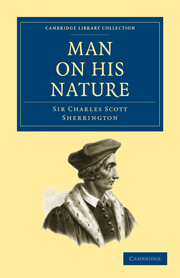Book contents
- Frontmatter
- Preface
- Contents
- Illustrations
- I Nature and Tradition
- II The Natural and Superstition
- III Life in Little
- IV The Wisdom of the Body
- V Earth's Reshuffling
- VI A Whole Presupposed of its Parts
- VII The Brain and its Work
- VIII The Organ of Liaison
- IX Brain Collaborates with Psyche
- X Earth's Alchemy
- XI Two Ways of one Mind
- XII Conflict with Nature
- Index
XII - Conflict with Nature
Published online by Cambridge University Press: 07 September 2010
- Frontmatter
- Preface
- Contents
- Illustrations
- I Nature and Tradition
- II The Natural and Superstition
- III Life in Little
- IV The Wisdom of the Body
- V Earth's Reshuffling
- VI A Whole Presupposed of its Parts
- VII The Brain and its Work
- VIII The Organ of Liaison
- IX Brain Collaborates with Psyche
- X Earth's Alchemy
- XI Two Ways of one Mind
- XII Conflict with Nature
- Index
Summary
What! out of senseless Nothing to provoke
A conscious Something to resent the Yoke!
Edw. Fitzgerald'sOmar Khayyám.A lover would not tread
One cowslip on the head
Though he should dance from eve to peep-o'-day.
Keats.Like as old Earth's, that lolls through sun and shade,
Our part is less to make than to be made.
Anon.By the kindness of a friend, a connection of Lord Gifford, there came to me some years since a copy once Lord Gifford's of the “Shorter Catechism”. Within it a paper slip which had plainly long rested where I found it, lay at the page whose main paragraph opens, “Religion is of all things the most excellent and precious.” Now, Lord Gifford in founding these lectures desired their subject to be “treated as a strictly natural science”. Though the lecturer was not to be under restraint in dealing with his theme, “Natural Theology”, he said, “I wish considered just as Astronomy or Chemistry.”
His expressed wish was that in regard to Natural Theology the facts which seem relevant be followed as in Astronomy or Chemistry. Facts as hard facts we have indeed to try to follow whithersoever they lead. But the desire that facts of Astronomy or Chemistry and the like be taken in examination of, to quote his own words, “the relation which man and the universe bear to Him” “the First and Only Cause”, is one less simple to fulfil. The difficulty arises that such facts are confined to the mechanical behaviour of electrons and similar elements and of aggregates of them.
- Type
- Chapter
- Information
- Man on his Nature , pp. 359 - 404Publisher: Cambridge University PressPrint publication year: 2009First published in: 1940



